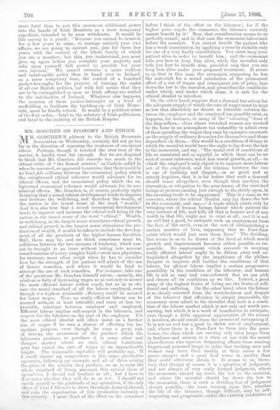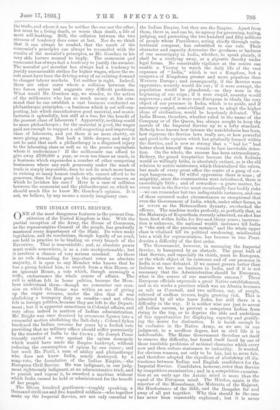MR. GOSCHEN ON ECONOMY AND ETHICS.
MR. GOSCHEN'S address to the British Economic Association on Wednesday, certainly did not go too far in the direction of exposing the weakness of emotional ethics. Perhaps, though it touched the true root of the matter, it hardly went far enough. But we are disposed to think that Mr. Goschen did concede too much to the ethical critic of " the dismal science," as Carlyle called it, when he assumed, or appeared to assume, that there could be no bond.fide collision between the economical policy which the enlightened ethical reformer would advocate for its ethical effects, and the economical policy which the en- lightened economical reformer would advocate for its eco- nomical effects. Mr. Goschen is, of course, perfectly right in saying that a sound ethical development tends to improve and increase the well-being, and therefore the wealth, of the nation in the truest sense of the word " wealth." And it is also true that a sound economical development tends to improve and increase the ethical well-being of the nation in the truest sense of the word "ethical." Wealth, or well-being, in the largest sense stimulates ethical growth, and ethical growth in the largest sense stimulates the pro- duction of wealth, if wealth be taken to include the develop- ment of all the products of the higher human faculties. Still, there may be, and we think sometimes must be, collisions between the two streams of tendency, which can- not be brought to an issue without taking into account considerations of a very complex kind,—such as a physician, for instance, must often weigh when he has to consider how far the strength of his patient will admit of the use Of heroic remedies, and where it would be fatal to attempt the use of such remedies. For instance, take one of the questions Mr. Goschen himself raises,—namely, the wisdom or folly of increasing wages so as not only to secure the most efficient labour within reach, but so as to ele- irate the moral standard of all the labour employed, even though tl e highest attainable efficiency could be secured for lower wages. Now, no really efficient labour can be secured without at least tolerable, and more or less im- ttrovable, relations between employer and employed. Efficient labour implies self-respect in the labourer, and respect for the labourer on the part of the employer. Yet the mere ethical idealist will often insist on a further lase of wages if he sees a chance of effecting his im- Mediate purpose, even though he runs a great risk of driving the consumers of the product which the labourers produce, to purchase it iu some other and Cheaper market where no such ethical fastidious- ness has raised the rate of wages to an impracticable fieight. The reasonable capitalist will probably say, • If I could ensure my competitors in this same productive operation, following my example, and all of them raising the price of the articles they produce, so as to raise the Whole, standard of living amongst this special class of 8peratives, I should not hesitate at all ; but I have to determine whether they will do so or not. I should not entitle myself to the gratitude of my operatives, if the only effect of what I did were to drive the whole demand abroad, and ruin the organisation of this productive industry in t'his country. I must think of the effect on the consumer before I think of the effect on the labourer ; for if the higher price repels the consumer, the labourer certainly cannot benefit by it,' Now, that consideration seems to us perfectly sound ; and in that case the economist takes rank before the moralist. You cannot benefit the patient who has a weak constitution, by applying a remedy suitable only for one of a very hardy constitution. You must keep your patient alive in order to benefit him ; and the economist tells you how to keep him alive, while the moralist only tells you how to benefit him, provided only that you can keep him alive under your proposed treatment. It seems to us that in this case, the economist, supposing he has the materials for a sound calculation of the permanent effect of a rise of wages and consequent rise of price, lays down the law to the moralist, and prescribes the conditions under which, and under which alone, it is safe for the ethical idealist to interfere.
On the other hand, suppose that a demand has arisen for the adequate supply of which the rate of wages must be kept so low that absolutely no decent or tolerable relation be- tween the employer and the employed can possibly exist, as happens, for instance, in many of the " sweating " dens of the slop-sellers,—dens where wretched women are worked to the bone in an atmosphere too unhealthy to admit even of their spending the wages they earn by excessive overwork on the supply of ordinary decencies for themselves and those dependent on them,—this would be a condition of things in which the moralist would have the right to lay down the law to the economist, and say : The moral evil of conditions of life so unnatural and so squalid, in which there can be no sort of moral existence, much less moral growth, at all,—in which the employer's only object is to squeeze more labour out of the employed, and the relation between the two is one of loathing and disgust,—is so great and so utterly hopeless, that it is far better that such a demand should cease altogether, even though that involves the starvation, or relegation to the poor-house, of the wretched.
beings at present earning just enough to die slowly upon, in the sweating trade to be suppressed.' This is a case, as we conceive, where the ethical idealist may lay down the law to the economist, and say,—' A trade which exists only by wringing out of human beings labour which poisons the very sources of life, and kills all that is human and of any worth in that life, ought not to exist at all ; and it is not an evil but a good, to extirpate such an employment from the face of the earth, even at the cost of extinguishing a certain number of lives, supposing that no Poor-Law exists which would just save those lives.' The dividing- line seems to us to be drawn at the level at which moral growth and improvement becomes either possible or im- possible. No employment which succeeds in securing really efficient labour ought to be driven away and ex- tinguished. altogether by the impatience of the philan- thropist to improve still further the conditions of that labour, for efficient labour implies a certain progressive possibility in the condition of the labourer, and human life is not so easy and rose-coloured. that we can pick and choose all its conditions as we like, Indeed, a good many of the highest fruits of living are the fruits of self- denial and suffering. On the other hand, when the labour is so clearly extorted from the wretchedness and despair of the labourer that efficiency is simply impossible, the economist must admit to the moralist that here is a condi- tion of the labour market which is not only not worth pre- serving, but which it is a work of beneficence to extirpate, even though a little apparent aggravation of the misery it involves, should result from the process of extirpating it. It is not an evil but a good to throw out of employment, and, where there is a Poor-Law to force into the poor- house, the class which are earning only what keeps them in fpulness and misery, in a state of war with the moral slave-drivers who squeeze despairing efforts from wasting fingers and poisoned lungs, in order that working men and women may have their shoddy or their calico a few pence cheaper and a good deal worse in quality than they could otherwise obtain it. It seems to us, there- fore, that though of course it is a question of judgment, and not always of very easily formed judgment, where the economist should lay down the law to the moralist, and where the moralist should lay down the law to the economist, there is such a dividing-line of judgment always possible,—the issue turning upon this, whether the life of the labourer, though difficult., may be self- respecting and progressive under the existing conditions of the trade, and where it can be neither the one nor the other, but must be a living death, or worse than death, a life of mere self-loathing. Still, the collision between the two streams of tendency does come at last. Nor do we think that it can always be evaded, that the result of the economist's principles can always be reconciled with the results of the moralist's principles, as Mr. Goschen in his very able lecture seemed to imply. The economist qud economist has always had a tendency to justify the sweater. The moralist qud moralist has always had a tendency to justify unreasonable strikes for higher wages, where the re- sult must have been the driving-away of an existing demand to cheaper labour markets. Yet neither is right. Indeed, there are other cases where a collision between the two forces arises and suggests very difficult problems. What would Mr. Goschen say, we wonder, to the action of the millionaire who has so much money at his com- mand that he can establish a vast business conducted on philanthropic principles,—a business which is not self-sup- porting, but which manufactures good material, and manu- factures it splendidly, but still at a toss, for the benefit of the poorest class of labourers ? Apparently, nothing could be more philanthropic ; for the material is good, the wages paid are enough to support a self-respecting and improving class of labourers, and yet there is no mere charity, no mere giving away. But look a little deeper, and may it not be said that such a philanthropy is a disguised injury to the labouring class as well as to the poorer capitalists whom it undermines ? If the millionaire can afford to give away £100,000 a year, or even ten times as much, in a business which supersedes a number of other competing businesses where any such generosity under the mask of trade is simply impossible, does he not do much more harm in ruining so many honest traders whc cannot afford to be generous, than he does good in the particular concern on which he lavishes his care ? Here is a case of collision between the economist and the philanthropist on which we should much like to know Mr. Goschon's opinion. It is not, we believe, by any means a merely imaginary case.



































 Previous page
Previous page